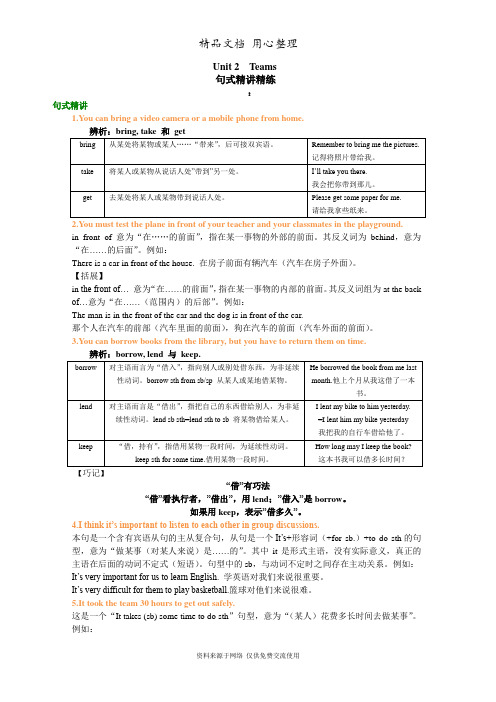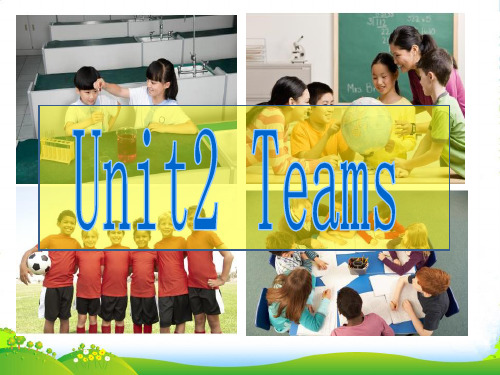初中英语(北师大版)八年级上册(八上)- Unit 2 Teams Lesson 6 A Special Team 学案.doc
- 格式:doc
- 大小:42.50 KB
- 文档页数:4

Unit 2 Lesson 5 Teamwork教材分析本课是北师大版《初中英语》八年级上册教材第2单元的第5课,话题为团队合作。
本课的教学设计分为两个课时。
第一课时侧重于对话的听力理解,学生通过听力活动,听出出三个学生所讨论的有关著名建筑物的课题,并能完成他们相关喜好的表格,同时获取他们讨论课题的细节信息。
听后依据表格和问题完成对话的复述,不断内化对话中的信息和语言,最后在能基于对话中的目标语言互相询问彼此的喜好,进行输出活动。
本课注重引导学生学会如何询问彼此的喜好,学会如何在团队中沟通的技巧。
通过本课学习,引导学生增强团队意识,学会倾听、尊重他人的习惯。
第二课时在复习对话内容和语言的根底上,引入本课语法工程—如何用…doing 来表达喜好。
学生在理解其语意功能的根底上,首先通过封闭性练习操练语言结构,然后通过半开放性练习提高语言的应用,最后用开放性的练习来强化并检测语言的应用效果。
教学内容话题:团队合作词汇:together, politely, doing research, doing research alone, role, question, suggest, discussion, excellent, poor, participated,task…策略:捕捉关键词抓主要信息;听前预测;语法:like/love, hate, don’t mind doing…第一课时First Period教学目标在本课学习结束时,学生能够:1. 学生能够通过听力活动,获取有关Adam、Luo Li和Rachel的课题信息;2. 学生能够根据表格和问题,完成对话复述;3. 学生能够根据团队评分规则,评价对话中团队合作。
教学过程第二课时Second Period教学目标在本课学习结束时,学生能够:1. 学生能够运用所学音标/e/ 和/æ/ 朗读含有相关音素的绕口令;2. 学生能够通过选词填空和完成评价表对词汇复习;3. 学生能够通过观察、发现、操练、应用完成like/love doing, hate doing, mind doing和can’t stand doing 的应用;4. 学生能够增强小组合作意识,培养合作意识。

Unit 1 TelevisionLesson 1 Last week on TVBy listening to the TV programs discussed by the four reviewers and their emotional attitude and other details, education students like to watch different personalities of different TV programs. Introduce the t opic of this unit to stimulate students’ interest in the topic. Activate students’ existing TV program vocabulary, solve students’ existing knowledge, and prepare for the final output of the class. Students imitate the example sentences given by teachers, use key words to describe their favorite TV programs, and make a preliminary warm-up for the listening topic.【知识目标】Learn about the use of participle adjectives (-ed and -ing forms).Learn about simple past tense.Talk about a TV program.【能力目标】To tr ain students’ listening and reading skill.Verbally describe why the four reviewers liked the TV shows and discussed their favorite TV shows and reasons with their peers.【情感目标】They should read more news, learn about national events, and become a person with broad vision, love life, and love nature.【教学重点】Focus on the positive and negative sentences in the past tense.【教学难点】Guide students to use the sentence patterns flexibly in activities and life, and cultivate students’ ability to read English.MultimediaStep 1. Warm upIs learning a language difficult?Look at the key words. Listen and read.Key words: Language learningcharacter, conversation, grammar, listening, passage, pronunciation, reading, speaking, vocabulary, writingChoose the correct words to complete the sentences on the right.1. She speaks English very well. Her __________________ is quite good.2. He is learning to write Chinese _________.3. Sometimes ____________________ rules are hard to remember.4. I just read an interesting _________ in an old book.5. We had a long ____________ about the interview on the Internet.Step 2.Discussion1. What do you think is difficult about learning a language?2. Have a discussion with your partner, using the key words.Step 3.Listening1. When did Tina come to Beijing?2. Did Tina like her teacher?What did Tina do in her Chinese class?Listen to the first part of the interview and answer the questions.1. When did Tina come to Beijing?2. Did Tina like her teacher?3. What did Tina do in her Chinese class?Think about the information in the chart.Listen to the second part of the interview and complete the notes about James. James—learning ChineseListen to the whole interview and write Tina, James or Tina &James in each blank.1. ______learned some Chinese from games and TV.2. ______ began learning Chinese at university.3. _____________ think(s) Chinese writing is difficult.4. ______ didn’t speak any Chinese before 2008.Step 4.Grammar一般过去时态:陈述句变一般疑问句1. 当句中含有系动词was/were或情态动词could/would时,把系动词或情态动词提到句首。

Unit 2 Teams句式精讲精练:句式精讲1.You can bring a video camera or a mobile phone from home.辨析:bring, take 和get2.You must test the plane in front of your teacher and your classmates in the playground.in front of 意为“在……的前面”,指在某一事物的外部的前面。
其反义词为behind,意为“在……的后面”。
例如:There is a car in front of the house. 在房子前面有辆汽车(汽车在房子外面)。
【括展】in the front of… 意为“在……的前面”,指在某一事物的内部的前面。
其反义词组为at the back of…意为“在……(范围内)的后部”。
例如:The man is in the front of the car and the dog is in front of the car.那个人在汽车的前部(汽车里面的前面),狗在汽车的前面(汽车外面的前面)。
3.You can borrow books from the library, but you have to return them on time.辨析:borrow, lend 与keep.【巧记】“借”有巧法“借”看执行者,”借出”,用lend;”借入”是borrow。
如果用keep,表示”借多久”。
4.I think it’s important to listen to each other in group discussions.本句是一个含有宾语从句的主从复合句,从句是一个It’s+形容词(+for sb.)+to do sth的句型,意为“做某事(对某人来说)是……的”。
其中it是形式主语,没有实际意义,真正的主语在后面的动词不定式(短语)。



Unit 2 Lesson 6 A Special Team教材分析本课是北师大版《初中英语》八年级上册教材第2单元的第6课,话题为团队。
本课为本单元的第三课,主要讨论在地震这一特殊时间下人们是如何依靠团队的力量走出困境的,为最终进行本单元的综合语言输出奠定语言根底。
本课的教学设计分为两个课时。
第一课时侧重对阅读内容的理解,引导学生通过阅读获取有关一个团队在地震中如何自救的信息。
在阅读活动中,引导学生提取主要信息和细节信息,并注意在描述一场地震时使用的相关词汇,最后结合语篇信息和语言进行输出活动。
第二课时在复习语篇内容和语言的根底上,加强对描述团队活动词汇的理解,并了解一些带介词的短语的语用功能。
在语境中进行多层面的练习,最后运用所学词汇来描述某个特殊团队的活动。
教学内容话题:团队词汇:Getting Ready: special, couple, resort, earthquake, dark, heavily, ruins,blanket, flashlight, flash, etc.Lesson 6: shake, completely, call for one’s atte ntion, enough, divide,encourage, support, etc.策略:读前预测;读中通过关键词获取主要信息;根据上下文语境猜词第一课时First Period教学目标在本课学习结束时,学生能够:1. 通过阅读短文,获取有关一个团队在地震中如何自救的信息;2. 通过阅读,在语境中了解resort, flashlight等词的语义;初步运用call for one’sattention,encourage, support等有关地震和团队的词汇;3. 体会在地震这种特殊的时期团队的重要性。
教学过程第二课时Second Period教学目标在本课学习结束时,学生能够:1. 通过复习课文,在语境中运用描述团队活动的相关词汇:take the lead, callfor one’s attention, divide…into…, encourage, support, etc.;2. 通过复习课文,在语境中发现和归纳介词在短语on holiday, in just twominutes, at that moment, not enough…for, divide…into, use…as中的语意和语用功能;3. 运用本课所学词汇和介词短语,描述一个身边的特殊团队。
Unit 2 Teams
Lesson 6 A Special Team
学案
I. Read the text quickly. Complete the sentences with correct numbers.
1. The earthquake lasted for ____ minutes.
2. The Lins found ____ people at the resort.
3. Mr Lin divided the 25 people into ____ groups.
4. It took the team ____ hours to get out safely.
II. Read the text quickly. Choose the main idea of the story.
What’s the passage mainly about?
A. How a group of people saved others after an earthquake.
B. How a group of people helped each other after an earthquake.
III. Read part by part.
Part One
--What
Part Two
IV. Interview
1.Mr Lin ___________ and helps everyone to work together.
2.Mr Lin __________________ and said, “The roads are dangerous!”
3.There are not ________ blankets ____ everyone.
4.The leader ____________ the people ________ five groups.
5.They walked for 6 hours. It was a very difficult ________ and everyone was
tired.
6.The group members _________ and __________ each other, so they could
get out safely.
VI. Complete the sentences with the correct prepositions from the box.
1. The couple was ____ holiday at a mountain resort.
2. ____ just two minutes, everything changed.
3. ____ that moment, Mr Lin decided to take the lead.
4. There wasn’t enough food ____ everyone.
5. They used mobile phones ____ flashlights.
6. ____ then, it was 30 hours after the earthquake.
VII. Complete the passage with proper words.
We went on a school trip last Saturday. In the morning we went to a mountain ____. At 4 pm, the weather suddenly changed. It was dark and started raining _______. There weren’t ______ um brellas ____ us. Some of us were _______ wet. Some girls cried. __ ____ ____, Mingming ____ ___ ____ and he decided we should go down the mountain at once. Although it was a difficult ______, we _____ and _____ each other, and finally we got home safely.。